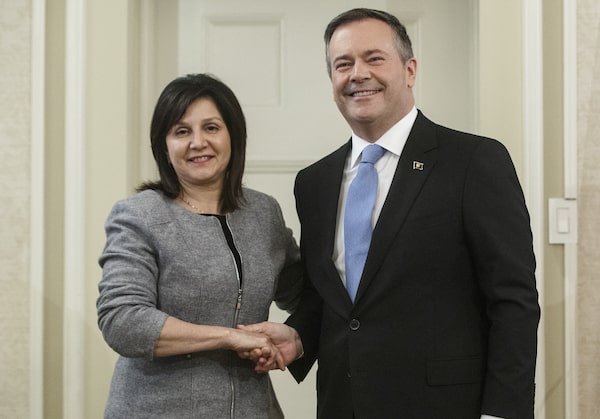
Alberta premier Jason Kenney shakes hands with Adriana LaGrange, Minister of Education after being is sworn into office in Edmonton on April 30, 2019. Mr. Kenney and Ms. LaGrange recently announced $45-million for schools to provide more supports this fall for an estimated 50,000 students who have fallen behind during the pandemic.JASON FRANSON/The Canadian Press
Matt McCormack has three children enrolled in school in Alberta. At the start of the pandemic, his youngest son, Alexander, was finishing up Grade 3 and was sent into the unfamiliar world of online classes, struggling with a lack of hands-on learning and interactions with his peers and teacher.
Due to the cancellation of parent-teacher interviews and provincewide standardized testing, Mr. McCormack and his wife could not gauge Alexander’s performance.
“We tried our best to make sure we were doing what we could on our end,” he said.
Experts across the country have warned of pandemic-related learning loss in the past year, and some students have fallen behind entire grade levels. For example, the Toronto District School Board said in a report released in March that more students were reading below grade level than before the pandemic. According to research conducted at the University of Alberta, students in Grades 1 to 3 who were already struggling with reading were well behind their peers when they returned to school in September, 2020.
Experts say early interventions are required to ensure students’ future academic success and prevent the need for years of heavy investments by school districts to give these students extra instruction. Increased hands-on learning is also essential to ensure students develop social and emotional skills they may have missed when they were not in the classroom, the experts say.
Premier Jason Kenney and Education Minister Adriana LaGrange recently announced $45-million for schools to provide more supports this fall for an estimated 50,000 students who have fallen behind during the pandemic. The Premier and Education Minister cited the University of Alberta research as the reason for the funding increase.
“This investment is to ensure that students who have experienced learning loss get the timely help they need so that no student is left behind,” Ms. LaGrange said at the time.
When classes resume in the fall and school authorities determine which students are behind, they can apply for funding to hire more staff such as teachers, educational assistants and substitute teachers to give these children extra help, Ms. LaGrange said. Details on the application process are to be released in the coming weeks. Students will be assessed after 16 weeks to ensure their literacy and numeracy skills have improved.
George Georgiou, a professor in the department of educational psychology at the University of Alberta and author of the study, discovered that some students were reading below grade level when they returned to school last fall. Those who struggled the most were in primary school, but with early interventions, 80 per cent caught up to grade-level reading, his report said.
If students don’t meet grade-level reading by Grade 3, Dr. Georgiou said in an interview, 75 per cent of them will never catch up and will require support throughout their school careers. “It’s in the best interest of our school divisions and parents to help their kids overcome their reading difficulties as soon as possible.”
Low literacy levels are also linked to higher dropout rates, difficulties with mathematics and transitions into junior and high school, and behavioural issues, he added.
Dr. Georgiou said parents must speak with teachers regularly to ensure their children are on the right track. They should also arrange for additional intervention programs or supports in the summer to reduce learning loss.
Mary Reid, an assistant professor in math education at the University of Toronto, said students most affected by learning loss are from marginalized communities. These students may not have access to private educational supports during the summer or school year, or their parents may not be able to dedicate chunks of their days to helping them, and this could lead to more significant learning gaps, she said.
While it’s vital to address learning loss, Dr. Reid said schools will also need to emphasize social-emotional learning, because children find it easier to learn this way, and it can help them and catch up in areas where they are struggling.
Over the past year, students have missed these learning experiences, such as using math manipulatives in small groups, or socializing with their peers. This loss reduces motivation and causes stress on students, she said.
To address this, she said, the Alberta government should provide more opportunities for primary teachers to create collaborative and supportive lessons in math and literacy for the upcoming school year. Dr. Reid also said more funding should be allotted to buying math manipulatives such as blocks and games to engage students with their studies.
“[Students] don’t think about memorizing all the formulas for an exam or a test. They think about how they were able to solve that incredible problem with their best friend,” she said. “That’s sustainable learning.”
Sarah Hoffman, NDP education critic, said it’s “not surprising” that students in Alberta have fallen behind in the past year, especially given the cuts in funding for educational assistants and substitute teachers during the pandemic, in addition to disruptions caused by shifts between in-person and online learning.
“Forty-five million dollars divided by every school in Alberta is not a lot of money,” she said. “More should have been done earlier.”
We have a weekly Western Canada newsletter written by our B.C. and Alberta bureau chiefs, providing a comprehensive package of the news you need to know about the region and its place in the issues facing Canada. Sign up today.